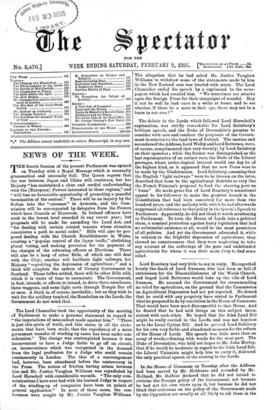The debate in the Lords which followed Lord FIerschell's explanation,
was chiefly remarkable for Lord Salisbury's brilliant speech, and the Duke of Devonshire's promise to consider with care and candour the proposals of the Govern- ment in relation to the land laws of Ireland. The movers and seconders of the Address, Lord Welby and Lord Battersea, were, of course, complimented (not very warmly) by Lord Salisbury on their speeches ; while the former was distinguished as the last representative of an extinct race, the Dodo of the Liberal peerages, whose archmological interest would one day be of the highest kind, as it appeared that no new Peers were to be made by the Gladstonians. Lord Salisbury, assuming that the English "light railways" were to be thrown on the rates, described that boon to the agricultural districts as very like the French Princess's proposal to feed the starving poor on
buns." He made great fan of Lord Rosebery's sensational appeal to his followers to make the greatest breach in the Constitution that had been conceived for more than two hundred years, and the modesty with which he had afterwards suppressed all reference to that policy in the Queen's Speech to Parliament. Apparently, he did not think it worth mentioning to Parliament. To turn the House of Lords into a political sham, a nominal protection against hasty legislation that had no substantial existence at all, would be the most pernicious of all policies. And yet the Government advocated it, while in relation to the frightful depression of agriculture, they showed no consciousness that they were neglecting to take any account of the sufferings of the poor and undefended agriculturist for whom it was their main duty to find some relief.






































